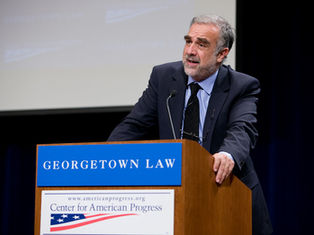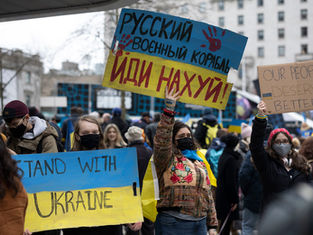top of page
Articles


History in Turmoil
Convince an enemy, convince him that he’s wrong Is to win a bloodless battle where victory is long A simple act of faith, in reason over...

Dmitri Safronov
50 min read


Children as a Vehicle of Genocide
Introduction The epitome of the 21st century’s Russian war against Ukraine manifested itself in Vladimir Putin’s speech on the morning of 24 February 2022.[1] In his address, the Russian President announced a series of wars against the collective West and the sovereign state of Ukraine. The massive Russian military attack on Ukrainian land, air, and sea was presented to the Russian public as ‘a special military operation’. According to President Putin, ‘The purpose of this

Iryna Zaverukha
34 min read


Exposing Torture Crimes in Russian Prisons: In Conversation with Vladimir Osechkin
Vladimir Osechkin is a Russian-born human rights activist and founder of Gulagu.net, an NGO that documents and exposes crimes committed by Russian officials and the FSB. In November 2021, Osechkin was placed on a wanted list by the Russian state after leaking a large archive of documents, photos, and videos with hundreds of cases of rape and torture of inmates in Russian prisons directed by prison officials. Since August 2022, Osechkin has urged former Russian soldiers and di

Nadia Jahnecke
11 min read


Human Rights between Universality and Indivisibility: In Conversation with François Zimeray
François Zimeray is a prominent French diplomat, lawyer, former politician, and human rights activist. Zimeray previously served as France’s Ambassador-at-Large for Human Rights. He later became the French Ambassador for the Kingdom of Denmark in 2013. This interview was conducted on 14 September 2023. CJLPA : Welcome, Mr François Zimeray. We would like to begin by thanking you for taking the time to come and interview with The Cambridge Journal of Law, Politics, and Art

Nadia Jahnecke
18 min read


Harmonizing International Law and Political Power: In Conversation with Luis Moreno Ocampo
Luis Moreno Ocampo is an Argentine Lawyer and prosecutor who played a critical role in the Trial of the Juntas during Argentina’s democratic transition and later went on to serve as the first prosecutor at the International Criminal Court from 2003-2012. He is now a senior fellow at the Carr Center for Human Rights Policy at Harvard University.

Aidan Johnson
13 min read


Confiscation of Russian Assets: Legal, Human Rights, and Political Limitations
Moral considerations in confiscating Russian assets Russia’s full-scale war against Ukraine has been going on for almost two years. During this time, Russia has committed brutal crimes against Ukrainians, which were witnessed by the international community. In February 2023, the UN General Assembly demanded that Russia stop the war and immediately withdraw its army from Ukraine.[1] In March 2023, the International Criminal Court (ICC) issued an arrest warrant for Vladimir Put


Anemones of the People
Knuckle dragging, low-slung, dead pig-eyed, A belch or a growl passes for thought, Ogres, tramping through dirty snow fields To sniff out...

Paul Pickering
2 min read


Doubtful Legislative Innovations: Criminalising Wartime Collaboration during Russian Aggression in Ukraine
1. Historical Overview of Wartime Collaboration In situations of armed conflict, it is almost inevitable that there will be instances of civilians or combatants cooperating with the opposing side. The parties involved in the conflict often attempt to gain an advantage by turning their opponent's people against them. At the same time, individuals may collaborate with the enemy for various reasons, including personal conviction, desperation, or coercion.[1] As historian Gerha

Artem Nazarko
36 min read


Justice for Victims and Survivors of Sexual Violence related to Russia’s Armed Aggression in Ukraine
І. Sexual violence as Russia’s weapon in the war against Ukraine: History and the present On 24 February 2022, Russia launched an open military attack on Ukraine. The Russian troops invaded Ukraine near Kharkiv, Kherson, Chernihiv, and Sumy. As early as the beginning of March 2022, Russian troops occupied several population centres in the Kyiv region, including the town of Bucha. The world became acutely aware of the horrifying atrocities and war crimes committed in Bucha f

Khrystyna Kit
10 min read


Human Rights and the Russia-Ukraine War: In Conversation with Oleksandra Matviichuk
Oleksandra Matviichuk is a prominent human rights defender, currently leading the Center for Civil Liberties and coordinating the...

Nadia Jahnecke
16 min read


Ukrainian Heritage Held Hostage: Crimean Gold’s Long Way Home
I. Introduction 2014 was the beginning of a turbulent but crucial journey for the Ukrainian identity to gain a foothold. In February of...

Leila Kazimi
18 min read


Reparations for Atrocity Victims in Ukraine: Survivors’ Aspirations and the Emerging Legal Framework
Introduction Russia’s aggression against Ukraine, especially its full-scale unfolding since 2022, has highlighted many important issues...

Kateryna Busol
22 min read


International Criminal Law and the Russia-Ukraine War: In Conversation with Andrew Clapham
Andrew Clapham is Professor of International Law at the Geneva Graduate Institute, which he joined in 1997. He was the first Director of...

Shahad Alkamas
23 min read


Art under Siege: In Conversation with Mykhailo Glubokyi
Three Stories of Art and War II коли гуркочуть гармати- музи замовкають The Russian invasion catapulted the Ukrainian art world into crisis, and desperate measures were undertaken to secure staff, collections, and artists. Dreams are deferred but stubborn resilience manifests as a desire to not only protect cultural heritage, but also somehow provide opportunities for continued creativity. Three institutions from all regions of Ukraine—Central, East, and West—reflect on their

Constance Uzwyshyn
10 min read


Putin’s Propaganda: A Path to Genocide
Russia’s assault on Ukraine continues to intensify as bombs increasingly hit city centres, destroying apartment buildings, theatres, and...

Marta Baziuk
4 min read


Art at the Arsenal: In Conversation with Olesya Ostrovska-Liuta
Three Stories of Art and War I коли гуркочуть гармати- музи замовкають The Russian invasion catapulted the Ukrainian art world into...

Constance Uzwyshyn
16 min read


Holding War Criminals to Account: The Challenges Presented by Information Warfare
The physical battlefield of the ongoing war between Ukraine and Russia is being closely scrutinised by the global community: each day,...

Alexandra Agnew, Mishcon de Reya
11 min read


Ukrainian Identity in Paint: In Conversation with Oleg Tistol
Oleg Tistol is one of Ukraine’s leading contemporary artists, who works with stereotypes associated with Ukrainian everyday life and...

Constance Uzwyshyn
19 min read


Building the Jam Factory: In Conversation with Bozhena Pelenska
Three Stories of Art and War III коли гуркочуть гармати- музи замовкають The Russian invasion catapulted the Ukrainian art world into crisis, and desperate measures were undertaken to secure staff, collections, and artists. Dreams are deferred but stubborn resilience manifests as a desire to not only protect cultural heritage, but also somehow provide opportunities for continued creativity. Three institutions from all regions of Ukraine—Central, East, and West—reflect on thei

Constance Uzwyshyn
9 min read


No Place Like Home: An Emigrant’s Epic Tale
Lesia's poem No Place Like Home explores the shared human longing for a home, not only as a search for a refuge or place to settle, or a...

Lesia Daria
1 min read


War from the Verkhovna Rada: In Conversation with Mariya Ionova (MP)
Mariya Ionova wears many hats. She is a Member of the Parliament of Ukraine, holds a bachelor’s degree in Finance and Credit and a...

Constance Uzwyshyn
10 min read


A Fictional War (Which the West Can’t Win)
In Lesia’s three-in-one poem A Fictional War , two voices speak in separated monologues but are also integrated and juxtaposed. The poem...

Lesia Daria
1 min read


The Art Industry in Ukraine During the War
The article examines the current state of the Ukrainian contemporary art market in the aftermath of Russia’s invasion of Ukraine and the...

Gallery Portal 11
38 min read


The Visit of Czarevitch Nicholas Alexandrovitch to Lahore, January 1891
The below is adapted from Fakir Aijazuddin's 2021 book Imperial Curiosity: Early Views of Pakistan, 1845-1906 . Introduction The nineteenth century was a period of imperialist expansion. Powerful countries in Europe like Great Britain, Germany, and Russia recognized the potential of countries in the near and far East—potential for travel, for tourism, for the advancement of scientific knowledge, for trade, and perhaps most important of all, resources with which to fuel thei

Fakir Aijazuddin
19 min read
bottom of page


